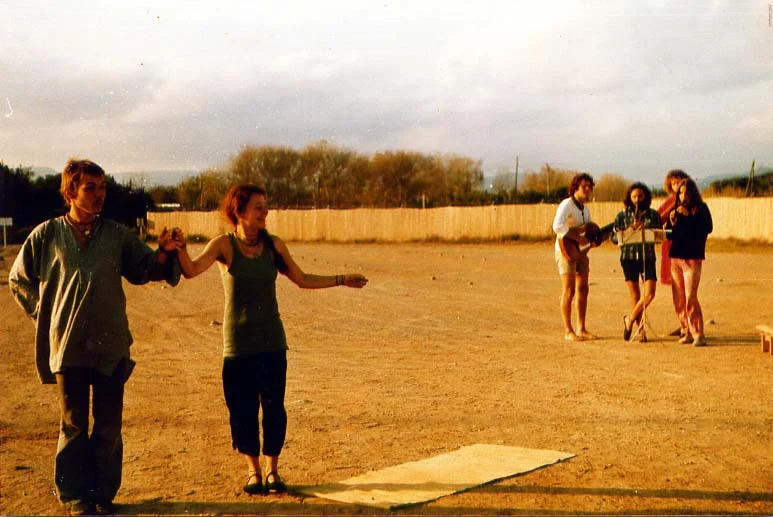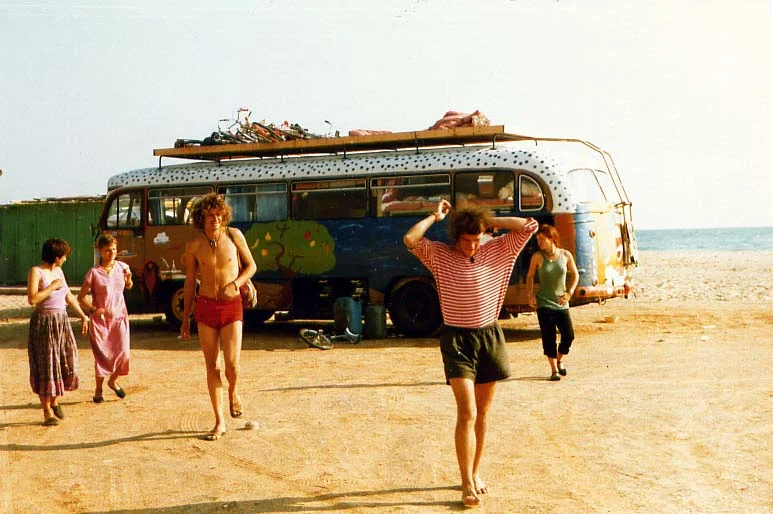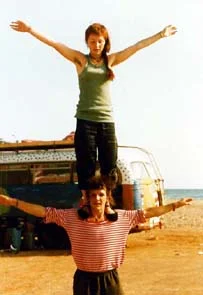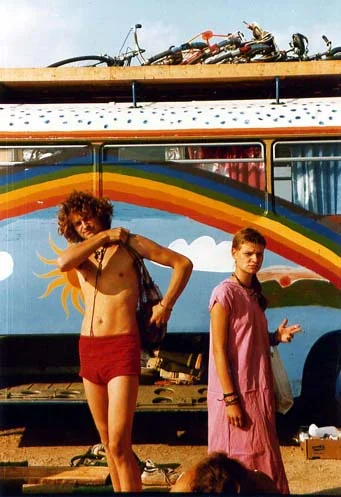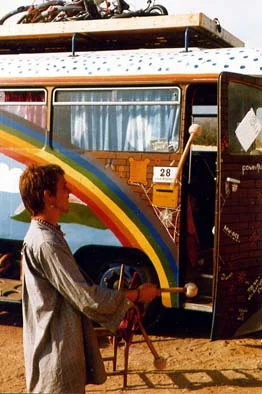Living in the bus
They left Holland quickly. They were ignored on the street. They kept themselves to the smaller cities. Paris was never an option.
16.08. - 29.08.1981
Nijmegen - Arnhem - Belgium - Rouen
For the first time, they are on the road in France. The problem with language is getting worse, but Manfred's knowledge is enough for their daily needs. Katharina learns French.
On the street, they meet other performers.
Katharina has to visit a medical-doctor. They are using their foreign travel insurance and an ADAC-check for the first time.
Ivan still has no real reference person and suffers from the tightness of the bus. In Rouen he nearly stepped in front of a car. Katharina takes care of him.
Alençon
A small cozy town where they play on a square in the center.
On the outskirts of the city, they camp in a meadow, get milk from the farmer and practice their horn instruments and saxophones for playing Dixieland for the first time. They play pieces from the Beatles, first of all "Yellow Submarine", which soon is changing to Rainbow Submarine and becomes their hymn.
LeMans
On the street during their performance, they met a woman who invited her to her home and helped her make a paid performance in a suburban district. She is a social worker and tries to get a bit of color in the dreary concrete silos with our appearance. At the performance, they are bombarded with a stones.
You have an evening a house almost by itself and use it for bathing and showering. They celebrate a party.
Some days they live in a forest.
Hermann has secret doubts, which lead him to ambiguous feelings and thoughts. He experiences a crisis.
Nantes
Everywhere there are posters of the autonomous movement of Brittany.
Pornic
They reach the sea for the first time. (Katharina)
Seppel learns playing Mousette dances on the accordion
LaRochelle
They play at the port in the cafes and earn a lot of money. Manfred plays solo and performs songs by Jaques Brel and enthuses his listeners.
The bus is located at night near the port in a parking lot, where under plane trees on dusty ground many youthful backpackers stay overnight.
Bine is practicing in Nantes
02.09. - 28.09.1981
Bordeaux
They arrive the city with a broken brake, the first time the bus has been damaged.
They put the bus in a parking lot right next to the American circus, which is questing in town at the same time.
Lacanau Ocean
Hermann knows a beach close to Bordeaux from a vacation trip some years ago. Their they supposed to meet August for the planned workshop. He comes with his girlfriend. However, the workshop is not taking place because in the same time five friends from from Fulda are arriving, Biggi and Susanne accompanied by Ali, Marion and Regine. Old relationship stress is dominating the stay and they cancel the workshop.
Ali came to stay. No discussion this time.
Biggi and Hermann have a birthday. Hermann colors his hair red and takes a LSD trip.
August teaches how to make mayonnaise.
Ali is teaching Seppel how to juggle.
Manfred and Jutta are practicing Beatles-songs with Seppel and Katharina, a capella.
They agree on a new meeting with August in the winter somewhere further south.
August is considering openly with the idea of joining the bus for the first time.
Bordeaux
They have success in Bordeaux and making so much money with their street-performance that they only have to work on weekends. During the week they are living on the beach in Pyla sur Mer close to Bordeaux.
Geigi's sister Gundi comes for a visit.
Christian from Munich, finally was able to sent them the sound system they were waiting for since the beginning. Now they can play with electric guitars in the street.
Biene falls in love with Luigi, who works at the American circus in the elephant tent. He's getting them all free tickets to a show.
There's a lot of work to be done on the beach. Everyone learns to juggle. Bine, Jutta, Ali and Seppel are developing a new piece: The Doll.
Ali is bringing a lot of new ideas and is having a lot of fun with Seppel.
In Bordeaux, the new pieces are being tried out. Dixie music becomes a part of her show.
Stealing in department stores has become fun for some of them until Ali and Hermann gets busted. They were banned from the store, nothing more, but it was a reminder.
They try to buy dope for the first time and get ripped off.
Pyla sur Mer
Celebrating Seppel's birthday in Pyla with with stolen gourmet food.
A letter from Christian in Munich tells about his indictment against throwing stones at a demo in Berlin. He was in custody. The events in Berlin made them very concerned.
During a shopping tour in Arcachon, the bus gets into a customs check. The bus is being thoroughly searched for drugs. Nothing is found.
Bordeaux
It's getting autumn.
A nightly storm is ringing in the autumn. They are staying mainly inside the bus. It's raining. They are making plans for the winter and consider going to Mallorca. After Biene is receiving her new flute from Germany they decided to drive on.
At the last performance in Bordeaux, a woman invites them to dinner at her house.
At the last performance in Bordeaux, a woman invites them to dinner at home. It was a sumptuous meal for the vegetarians. Since the apartment was in a block of flats, they aren't able to make any music though they inviting the family into the bus, drive out into the woods and play their entire repertoire.
Leaving Bordeaux. At the moment of departure, Christian and Garry ask to stay for a few more days.
Christian and Garry, a Danish and an English guy picked up as hitchhikers are joining them. They'll be with them for a while.
Biggi & Geigi meeting in Lacanau
Bin & Jutta performing a scetch
1.10.-14.10.1981
Toulouse
It was raining, so they could hardly play. The police also made trouble and sent them away.
They had gotten used to laundering their clothes in the launderette for a lot of money and combined this often with visits to the supermarkets. Stealing food became a sport. Once one of them was caught, the whole group was thrown out of the supermarket. Strangely enough, the police never played a role in this.
They were enjoying themselves in their gypsy life and showed it through their colourful clothes.
They met an Englishman who told them about a convoy of buses, coming from the summer festivals in southern England to the continent and wanting to meet at the Mediterranean near Perpignan. He described a possible rendezvous point on the coast.
During the journey they often picked grapes and processed them into grape juice. The fermentation and shaking in the bus caused the bottles to explode.
In the meantime, Biene had fallen in love with Christian. He and Garry left the bus because they wanted to go to the grape harvest,
Carcasonne
For the first time they are in financial problems because the group performances in the street don't bring any more money. Some of them play individually and it becomes a tedious compulsion to perform. Seppel plays alone with the accordion for hours. Geigi and Hermann try Irish songs with violin and guitar. They also try to perform in restaurants. the question is: Do they put all the money into the common purse or can they put in their own money?
Geigi has a fierce quarrel with Manfred.
Catherine has to have a surgery because of her troubles with her wisdom tooth.
They managed to get a stage appearance in the pub "La Petassou". They plan something special and design a show just for this evening. It became a disastrous dilletant failure, but the excessively well-meaning audience saved the evening.
On the last day they had a meeting with two gypsies who wanted to exchange a violin for a viola. The gypsies met them on a large parking lot and presented a Mercedes trunk full of violins. Geigi could not resist and gave his viola, which he had borrowed from a friend in Fulda, for a violin he liked.
Seppel, Ali & Manfred checking out Carcassone
14.10.-28.10.1981
Perpignan
There is little opportunity to perform in the streets. There's a long pedestrian promenade winding through the old town and at its end a square with a few cafés.
Seppel is performing alone with his accordion and plays the same musette dances over and over again. He had bought the sheet music in Bordeaux and was now studying it. While he was playing, he tapped from one foot to the other in the rhythm of the three-quarter beat and smiled at the many schoolgirls who are standing around him adoringly.
Carnet-Plage
They drove down to the sea again and camped in a quiet place. Laundry flutters to dry on a big line in the wind. The police came and wanted to send them away because they did not tolerate gypsies. The group referred to the nearby tourist centre and explained that they were young Germans on holiday and would stay. But the laundry was no longer allowed to be hung up. That's why they wanted to leave.
Mario, their friend from the Zwiebel in Fulda, came to visit. He was on holiday with Marion and on his way back from Barcelona to Germany. He stayed with them for a few days.
In town they heard again about the English and that those people were camping on an occupied beach nearby, where a citizens' initiative protested against a building speculator. They decided to go there.
Bourdigou
They came to a vast desolate and deserted area. Here and there were some remains of old huts and a few bushes. A road, furrowed by heavy construction machinery, meandered through the terrain. It didn't seem like anyone was there. But Geigi and Marion had already driven up with Mario's little bus and explored everything. They showed the way. Slowly the bus staggered through the holes filled with deep water. Finally they were able to see the woodwork of the tip of a tippie and then next to it a bus and other vehicles. They were converted trucks with camping bodies. They found a convenient place to build up their camp close by.
Slightly shy and hesitant, they made the acquaintance with the English peolpe.
They were only a few steps away from the dunes that separated them from the sea. Not a single building was visible far and wide. Only nearby was a hut with a high straw bridle standing around. There lived an old fisherman, the last of a colony.
To meet these English hippies changed their everyday lives. They no longer drove into the launderette, but washed the laundry in large pots over an open fire. They also only cooked over open fire and ate their meals outside as long as it wasn't raining. They saved the gas for other occasions. This also saves them a lot of money. Jutta became the guardian of the fire.
Immediately on the first morning the English brought them a plastic bag full of marijuana, which they smoked at first hesitantly but later without shame regularly. The entire group has been high all day.
They developed an enormous amount of energy. Since some of the Englishmen also made theatre on the street, they showed each other their stuff and practiced together. They rehearsed music pieces and worked on the musical accompaniment of their pantomime pieces.
They lay naked on the beach and enjoyed the still warm autumn sun.
Mario tried his wind-surfing board and failed with a broken mast.
Ali and Seppel practiced juggling with homemade clubs. Bine trains unicycling with Ali.
They constantly collect wood for the fire and fetch water from an old well.
The sun rose over the Pyrenees, which one morning were covered with snow.
One evening everyone who lived in Bourdigou sat around a big campfire. A big pipe was passed on. Someone played flute and guitar. They were far from the world.
That evening in the Tippie of the Englishmen with fourteen people, Geigi developed the idea to get a Tippie of this kind at some point. Over the fire there was a pot with a simple pumpkin soup and people crowded against the tent wall. One was too busy with this fascination to feel the pain of the eyes tormented by the biting smoke.
In between they went to Perpignan and performed in the street, or played music in a restaurant in the evening. Burned brown and covered with sea salt, they seemed to be completely lost in reverie.
They played several times in a restaurant (Geigi knows the name). At a last performance there, Hermann fell in love with a red-haired French woman.
Eventually autumn storms came up. They tried to protect themselves from it for a few days, but it was clear that they had to go on.
Mario and Marion left them and went back to Germany. Mario wondered whether he would join them next year. His farewell and the farewell to Bourdigou was like a cut-off from the past. But it was only an illusion, as well as the "strong feeling of freedom" they experienced in Bourdigou.
Marion, Jutta, Geigi, Ali & Bine at the beach in Carnet-Plage
There are developments in the territory that would cause any prefect to pull his hair out. The typical example is the Bourdigou in Sainte-Marie. At the beginning of the 20th century, this small corner of the beach was built by the fishermen, some cabins, where they store their fishing gear. Some even live in it during the summer months. From 1936 onwards, with paid holidays, some families from the county came to build straw mats to spend the holidays there. Totally shaved in 1943 by the German occupiers, the Bourdigou was reborn from its ashes after the war. Then begins the conquest of the West, Sainte-Marie-la-Mer version. Little by little, constructions were added to those of the fishermen, including Galdric, an old fisherman Piannenc, who would be the soul of the village. "We choose a small plot of land, not far from the beach, we plant four stakes and build a shack in the middle. Preferred materials: reed and wood. How? Building permit? Purchase of land? Notary? Prefect? Késacko? We didn't give a shit."
At that time, there was no coastal law, no law at all. Just an extreme freedom and a huge conviviality between the people of this holiday city of a new kind. Over the years, the barracks have been improved, parties and barbecues organized and neighbours invited. We're thinking of the layout. Major roads are drawn between the huts to allow traffic. We find solutions for hygiene, waste water disposal.
Little by little, the Bourdigou is transformed into a real village with its streets and squares. At the end of the 1950s, it had 200 sheds. A Catalan village, where the locals make up 9/10th of the population. A village with a simple life where mutual aid is strong. "We take care of the neighbour's children, we get down from Perpignan what he needs. A village of freedom, no police, no lifeguard, no delinquency, no drowning and no moroseness." We'd party, bathe as we wanted, not bother. It was beautiful for the people who lived there," confides a witness of the time.
In the 70's, the hour of glory of the Bourdigou sounded. The phenomenon is growing incredibly. Almost all of Europe arrives: English, Dutch, German especially. Le Bourdigou appears on tourist brochures in Germanic language. The clandestine village of Le Bourdigou continues its anarchic expansion and now has almost 6,000 inhabitants. The trouble starts then. Fires destroy some straw huts. The prefecture asks that the village be razed. Then starts a strong protest, with petitions and clashes with the gendarmes. In 1976, sheds built on the maritime domain were razed. On 24 April 1979, under the damp eye of Galdric, the mayor of the free commune of Bourdigou, despite some clashes between the police and young bourdigueros, the rest of the barracks was razed. Not a single one has been preserved. Only remains for the elders of Bourdigou, the memory to have participated in a fantastic epic, one of the last before normalization.
Coastal development The struggle around the village of Bourdigou also marks the beginning of coastal development. All the other wild villages of the Bourdigou style, in Canet, Saint-Cyprien and Barcarès, were razed down in 1965 and gave way to the constructions of the developers. And this is how the seaside that we know from Barcarès to Canet Sud is created, a series of buildings along the beaches. As we used to say at the time:"Gold will be pouring down on the Languedoc-Roussillon". Especially in some people's pockets.
For the Bourdiguéros, the commune of Sainte-Marie offered the people parcels of land at unbeatable prices. All the houses built on the edge of the tourist information centre were sold to the "owners" of Bourdigou.





























